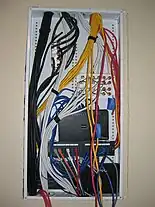Home automation software is software that facilitates control of common appliances found in a home, office, or sometimes a commercial setting, such as lights, HVAC equipment, access control, sprinklers, and other devices. It usually provides for scheduling tasks, such as turning sprinklers on at the appropriate time, and event handling, such as turning lights on when motion is detected. Typically the application will support multiple interfaces to the outside world, such as XMPP, email, Z-Wave, and X10.
The user interface of home automation software is often based on a client-server model, such as a web UI or a smartphone app, or some combination thereof. More advanced applications will allow users to write scripts in a programming language to handle more complex tasks. There are currently many competing home automation standards for both hardware and software.
Open-source software
This is a list of software across multiple platforms which is designed to perform home automation.
Closed-source software
| Name | Linux | Mac | Windows | Android | iOS | License | Technologies |
|---|---|---|---|---|---|---|---|
| Microsoft HomeOS | Yes | Academic license | |||||
| HomeSeer | Yes | Yes | Yes | Yes | Yes | Bluetooth, 1-Wire, Z-Wave, X10, UPB, Insteon, Infrared | |
| HomeKit[3] | Yes | Yes | HomeKit Accessory Protocol |
Proprietary hardware
This is a list of platforms that require custom, closed hardware for home automation.
| Name | Configuration Tools | Technologies |
|---|---|---|
| AMX LLC | Netlinx Studio, TPDesign | Configuration tools only work on Windows. |
| Control4 | Composer | Uses a Linux kernel, configuration tools only work on Windows. Platform also supports open hardware utilising the Z-Wave standard.[4] |
| INSTEON | INSTEON Hub, INSTEON for Windows | Lighting, appliances, sensors. Mobile apps for Android and iOS, configuration tools only work with Windows. |
| Lutron | Focused on lighting and shades, configuration tools only work on Windows. | |
| SmartThings | Lighting, appliances, sensors. Mobile apps for Android and iOS. | |
| Vivint | Sensors and one-touch hardware for security. | |
References
- ↑ Assistant, Home. "Integrations". Home Assistant. Retrieved 2021-06-04.
- ↑ "openHAB Add-ons". www.openhab.org. Retrieved 2021-06-04.
- ↑ "HomeKit Accessory Protocol Specification (Non-Commercial Version) - Support - Apple Developer". developer.apple.com. Retrieved 2020-08-30.
- ↑ "Control4 becomes latest company to join Z-Wave Alliance". IoTTech. IoT Tech News. 20 September 2016. Retrieved 28 September 2016.
